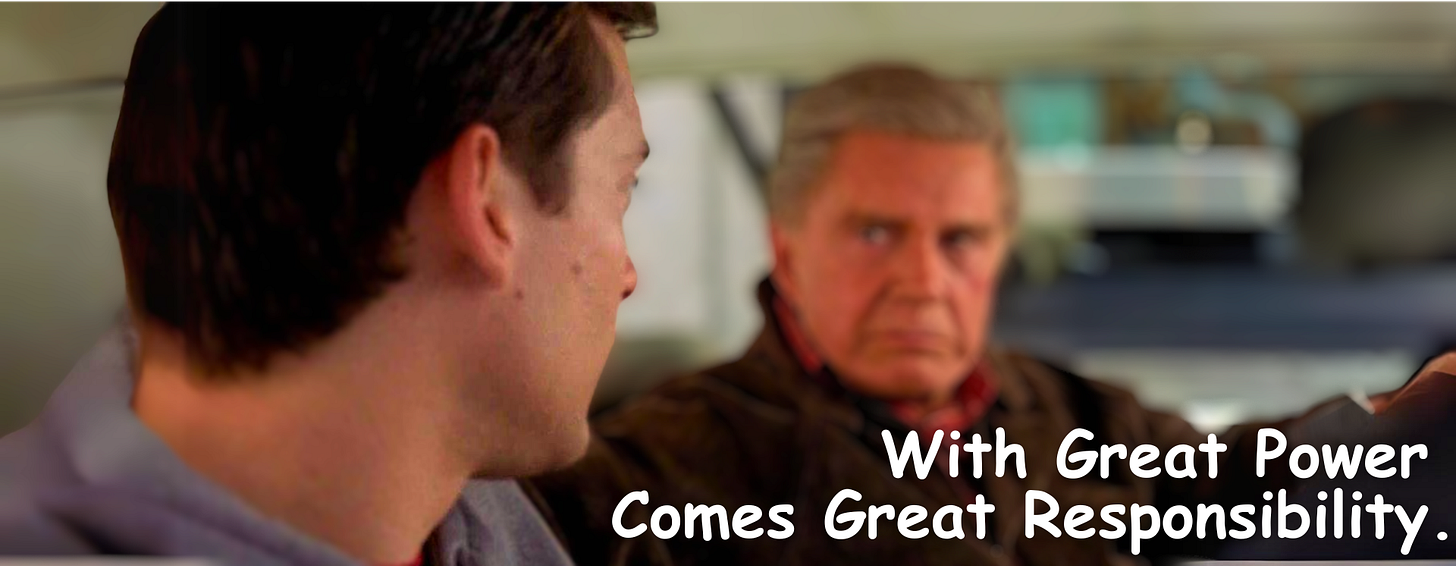Superpowers
and your superhero origin story
A bunch of readers of last week’s XL wrote to me to tell me that they enjoyed it, but were left wanting more practical guidance as to how to discover and pursue their unique spiritual callings.
This is well worth dedicating an XL to, so let’s go for it.
When I was a kid, I was into superhero comic books. Not only will I openly admit this nerdiness, but I will further come clean that I harbored suspicions that I possessed hidden superpowers of my own. It was just a matter of figuring out how I could tap into them.
On many a night, I lay in bed, trying to telekinetically move my bedroom door with my mind. My thinking was that when I’d move my hands, I wouldn’t explicitly think “hey, hands…move!” I would do it automatically and instinctually. If only I could believe in my powers to move objects with my mind as naturally as I moved them with my hands, they would move…
To this day, I’m still unsuccessful in my telekinesis aspiration. I was, however, comforted some years later by hearing from Jerry Seinfeld that I was not alone in my superhero delusions.
With age, however, I’ve come to see how every human being has been gifted a unique constellation of powers. Powers of wisdom, insight, intuition, compassion, discipline, beauty, influence — all of which, like I intuited as a child, should ultimately come to flow naturally through our fingertips, once we’ve honed them through study and practice.
If you don’t think these powers are super, you haven’t seen them used with excellence. They change lives, save lives and make the world go around.
These gifts are also not random goodies that happened to land in our baskets.
The same One Who put us here intentionally in the first place, has equipped us with precisely the tools we need to achieve the mission we were put here for.
This explains the deep archetype that runs through every superhero story. The villains see their powers as the means to fulfill their own personal agendas, while the heroes see their powers as the means to fulfill their higher calling.
In the timeless words of Uncle Ben, Spiderman’s uncle, “with great power comes great responsibility.” The gifts we’ve been given were not meant to merely be received, but to be given to others.
If only we could see our gifts for what they are — gifts that are meant to be given — and perceive the needs of others specifically in our corners of the world — we’d be able to reverse-engineer our Divine callings.
In superhero origin stories, there is often some external event that produces a mutation in the hero, giving him or her superpowers. They get electrocuted by lightning. Turned into a cyborg by the U.S. government. Or bitten by a radioactive spider. But for you and me, our origin stories are going to be more internal. They are about discovering the powers that were given to us at birth, and realizing that there are those who could benefit from our using them.
There is a wealth of wisdom in Torah literature on this subject. Here are six insights and practical exercises to help you discover your strengths and your corresponding mission:
1) Assess Your Assets
Rabbeinu Bachya ibn Paquda, the 11th century Andalusian sage, believed that people were wasting too much time and energy figuring what they should be doing with their lives when really it should be as intuitive as it is for animals. Seagulls don’t need to do long, online self-assessments to realize that they should fish for a living, and beavers don’t have to pay career counselors to figure out that they are built for building.
Seagulls instinctually know they enjoy the taste of fish, and that they have the speed, vision, and talons to catch fish — so that’s what they do.
Beavers relish the fragrance of fresh lumber, and realize that they are good at construction so they make a living by making dams.
One of the reasons humans get so confused is because when we’re kids, we’re constantly asked: what do you want to be when you grow up?
“I want to be a doctor.”
Well, do you like doing what doctors do?
“No, that’s the thing — I actually hate the sight of blood.”
Uh huh. I see.
Being a doctor is a job. Not an existential state of being.
If, however, we could start by thinking about what we love doing and what we are best equipped to do, we could then figure out what values we are best poised to add to our corners of the world.
EXERCISE #1:
There’s a tried and true reflective exercise you can do to get this awareness for yourself. It takes a bit of time, but it’s worth it.
What you’re looking for is your sweet spot where what you love doing overlaps with what you are particular good at doing, and where those two can be channeled to bring real value to the world.
Divide your life from when you started becoming a conscious young adult to adult into around ten “chapters” (e.g. high school, summer camp, college, first job, etc).
For each chapter, free write about what productive activities a) you most enjoyed doing, and which productive activities b) you excelled in. What projects did you get most into? Which achievements made you most genuinely proud? As you do, try to draw out the underlying skills.
Go through and highlight the themes you see. Try to use the same colors for related skills so you can start to see patterns.
Make two lists to summarize the skills/powers you clearly possess: a) what you love doing, and b) what you’re good at doing. Try your bests to order the lists from the things you most enjoy to least enjoy — most amazing at to least amazing at.
Find the overlap between the two lists.
Have conversations with different people you know about where you could put this overlap to work in the world.
2) Find Your Flow
There is a famous adage, “if you do what you love, you’ll never work a day in your life.” The underlying psycho-neurological phenomenon of this was recognized and called “Flow” by the positive psychologist Mihaly Csikszentmihalyi.
Prof Chiksenmihayi observed that when people tapped into their natural strengths, they would be filled with energy. They’d work all day, but not feel drained at the end of it. In fact, they would feel euphoric and more energized than when they started. Their wellbeing would be through the roof and so would their productivity.
The spiritual reason for this well-studied phenomenon is because when you tap into your natural strengths, you’re not draining your own batteries, you’re drawing from an Infinite Power Source that runs through you, called the “Chaya-חיה,” which literally means “Lifesource.”
EXERCISE #2:
As you go through our day, you do many tasks. Pay attention to your level of focus in those different things you do. Some demand energy and leave you depleted, and some give you energy and leave you feeling great. Which are which?
If nothing you do in your average day give you that flow, you’ll have to survey past jobs or hobbies. Ask yourself: why don’t you do more of the things that get you into this state?
3) Poll Your Fan Club
Three thousand years ago, King Solomon wrote a book of metaphors (called Proverbs or Metaphors, משלי) to transmit his wisdom in evocative, instructive and memorable ways.
There, he reveals that just like gold and silver are purified to their essence through a smelting furnace, so too, we can get to the essence of a person through their praises.
מַצְרֵ֣ף לַ֭כֶּסֶף וְכ֣וּר לַזָּהָ֑ב וְ֝אִ֗ישׁ לְפִ֣י מַהֲלָלֽוֹ׃
For silver—the crucible, for gold—the furnace,
And a person is purified by his praise.
When metals are heated, the secondary elements in the metal melt away, and what is left is the primary metal.
If you want to know what a person is really about — the purest stuff within them — you need to find what comes first to people’s minds when they think about them.
EXERCISE #3:
Ask your close friends and family members to describe your strengths. What parts of you do they consider your greatest strengths?
Make sure you ask in an open-ended, non-leading way. Don’t ask: “Do you think I’m smart?” Or “Would you say I’m good with people?” Ask instead: “What would you say are my strengths as a person?” Or “How would you describe me to others if you were trying to recommend me for a job or setting me up on a date?”
Pay attention to the first things they say as these are the things they most viscerally associate with you.
4) Who Are Your Heroes?
Rabbeinu Yonah of Girona understood the metaphor of King Solomon in a different way. For him, the way you get to the essence of a person is not by asking other people what they admire about them. Instead, ask the person himself what he or she admires about other people.
How do you know what a person’s values are? Asking them what they value about other people is a deeper way to know what they value than the behaviors others perceive in them from the outside.
EXERCISE #4:
Pick three people you most admire. Sit down and free-write a page of stream-of-consciousness what it is about them that you admire.
Then, with different-colored highlighters, color-code themes that pop out to you as you reread what you wrote. Meaning, if, in Person A’s paragraph, you wrote about their compassion, and in Person C’s paragraph, you wrote about their kindness, highlight those key phrases in both with blue, for example. This way you start to see patterns.
Summarize the main themes you see, and write about them. The values you’re wired to see in others, is a kind of x-ray vision you possess. You’re extra sensitive to these values in the world, and have a mission to bring these values in particular to their expression.
5) Draw From Your Soul Root
Rabbi Eliyahu Dessler, one of the great Torah teachers and leaders of the 20th century expanded the scope of a mystical principle that was previously thought of as only applying to the most righteous individuals. He instructed every Jew to carefully study the Torah’s vignettes of the lives of our founding fathers, Abraham, Isaac & Jacob, and think about who he or she resonates with most deeply. This resonance bespeaks of a soul-connection. It is their soul root.
The Torah isn’t a history book. It is a guidebook. When a Jacob-soul studies the life and spiritual path of Jacob, he or she is able to awaken, recognize and learn to channel spiritual abilities that would otherwise remain invisible and untapped.
EXERCISE #5:
You can use this excerpt from the book Nurture their Nature to get you started. It introduces the three “Soul Roots” of Abraham, Isaac and Jacob and begins to outline key moments in their lives and the dimensions that the Torah highlights about them.
Which one resonates most? Study the Torah about this tzadik as a reflection of your own superpowers and personal mission.
6) Pay it Forward
The greatest superhero of the Torah is undoubtedly Moses. Interestingly, the name we know him by — Moshe-משה — was not the name given to him at birth by his parents. The name “Moshe” was given to him by the Egyptian princess Batya who had mercy on him when she saw him in a basket floating among the reeds in the Nile river. As is well-known, he was placed in the river by his mother, in a last-ditch effort to save his life from the Egyptian soldiers who were on strict orders to all execute male Jewish newborns.
Batya named him Moshe-משה because “מִן־הַמַּ֖יִם מְשִׁיתִֽהוּ” — “he was [saved by being] drawn out of the water.”
The great Italian commentator Rabbi Obadiah Sforno noticed that according to the strict rules of grammar, he should have been called “Mishe,” not “Moshe.” The word “Mishitihu-מְשִׁיתִֽהוּ” means “being drawn from the water” in the passive voice. The long “o” vocalization of “Moshe,” instead connotes an active “drawing out” as if to say Moshe is the one “drawing others out of water.” Why did she name him with this twist?
Sforno explains that the reason she gave him the name Moshe is that she intuited that because this little baby’s life had been saved amidst the Egyptian holocaust of babies being slaughtered, his life would be dedicated to actively paying this forward to save others, which indeed he did.
EXERCISE #6:
What have other people done for you in your life that you feel uniquely indebted to pay forward to others?
What is a particular life-challenge, which because you went through it, you feel like you can relate better than most to those going through it?
Last week, we introduced the overarching principle of Rabbi Moshe Chayim Luzzatto that the foundation and root of a great life is for a person to “clarify and take to heart what is his personal debt in his personal world.”
Our lives are full of gifts. But every gift comes with a debt of gratitude. When we can see how our gifts can be used to give to others in our personal corners of the world, we are hearing our calling. As we do it, we fulfill our calling.
Here’s a link to order the book I coauthored with my dear friend Rabbi Dr Yosef Lynn on the subject of knowing ourselves so that we can better hear and follow our spiritual callings.












